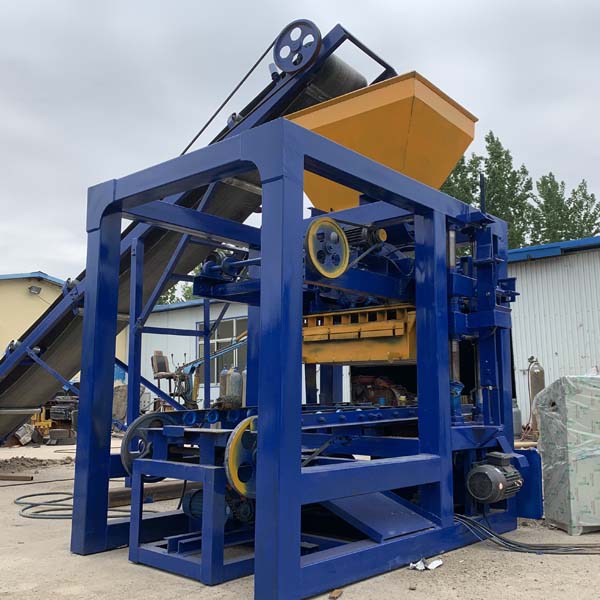
**Title: Building the Future: Market Opportunities for Full-Automatic Block Products in Infrastructure Projects**
**Introduction**
Infrastructure projects, vital for the growth and development of societies, present significant opportunities for the utilization of full-automatic block products. These versatile construction materials can contribute to efficiency, sustainability, and cost-effectiveness in a range of infrastructure developments. This article explores the market opportunities for full-automatic block products in various infrastructure projects, highlighting their potential impact on the construction industry.
**1. **Road Construction and Pavement:**
* **Opportunity:** Full-automatic blocks, known for their strength and durability, can be employed in road construction for creating stable pavements.
* **Advantages:** Interlocking blocks can enhance the stability of road surfaces, reduce erosion, and offer a more sustainable alternative to traditional asphalt or concrete pavements.
**2. **Retaining Walls and Slope Stabilization:**
* **Opportunity:** Full-automatic blocks, especially those designed for structural stability, are ideal for constructing retaining walls and stabilizing slopes.
* **Advantages:** The modular nature of these blocks facilitates quick and efficient construction, providing stability to embankments, preventing erosion, and enhancing overall safety.
**3. **Bridge Abutments and Infrastructure Foundations:**
* **Opportunity:** Full-automatic blocks with high load-bearing capacity are suitable for constructing bridge abutments and foundations.
* **Advantages:** The strength and stability of these blocks contribute to the longevity and resilience of critical infrastructure elements, reducing maintenance requirements over time.
**4. **Landscaping and Public Spaces:**
* **Opportunity:** Interlocking full-automatic blocks can be utilized for landscaping and creating aesthetically pleasing public spaces.
* **Advantages:** The versatility in design and color options allows for the creation of attractive patterns and structures in parks, plazas, and other public areas.
**5. **Sound Barriers and Noise Reduction Walls:**
* **Opportunity:** Full-automatic blocks can serve as effective sound barriers along highways and in urban areas.
* **Advantages:** The density and thickness of these blocks help reduce noise pollution, enhancing the quality of life for residents near busy roadways.
**6. **Water Management and Flood Protection:**
* **Opportunity:** Interlocking blocks can be employed in water management projects, such as constructing flood barriers and channeling water flow.
* **Advantages:** The modular design facilitates the rapid deployment of flood protection systems, helping mitigate the impact of flooding in vulnerable areas.
**7. **Utility Infrastructure (Manholes, Chambers):**
* **Opportunity:** Full-automatic blocks can be used in the construction of utility infrastructure, such as manholes and chambers.
* **Advantages:** The precise dimensions and structural integrity of these blocks contribute to the stability and reliability of utility structures, reducing the risk of failures.
**8. **Urban Development and Housing Projects:**
* **Opportunity:** Full-automatic blocks play a key role in urban development and housing projects, offering efficient and sustainable building solutions.
* **Advantages:** The speed of construction, coupled with the sustainability features of these blocks, makes them attractive for developers aiming to meet housing demands in a timely and environmentally responsible manner.
**9. **Airport Runways and Taxiways:**
* **Opportunity:** Full-automatic blocks can be used for constructing durable and load-bearing surfaces in airport infrastructure.
* **Advantages:** The strength and uniformity of these blocks contribute to the integrity of runways and taxiways, ensuring the safe and efficient operation of airports.
**10. **Railway Infrastructure (Platforms, Track Support):**
* **Opportunity:** Full-automatic blocks can be employed in railway projects for constructing platforms and providing support for tracks.
* **Advantages:** The precision in manufacturing and load-bearing capabilities make these blocks suitable for railway infrastructure, ensuring stability and durability.
**Conclusion**
The market opportunities for full-automatic block products in infrastructure projects are diverse and expansive. From road construction to utility infrastructure, these blocks offer a versatile and sustainable solution for various applications. As the demand for resilient and environmentally friendly construction materials continues to grow, full-automatic block manufacturers have the opportunity to play a pivotal role in shaping the infrastructure landscape, contributing to the development of safer, more efficient, and sustainable communities.
